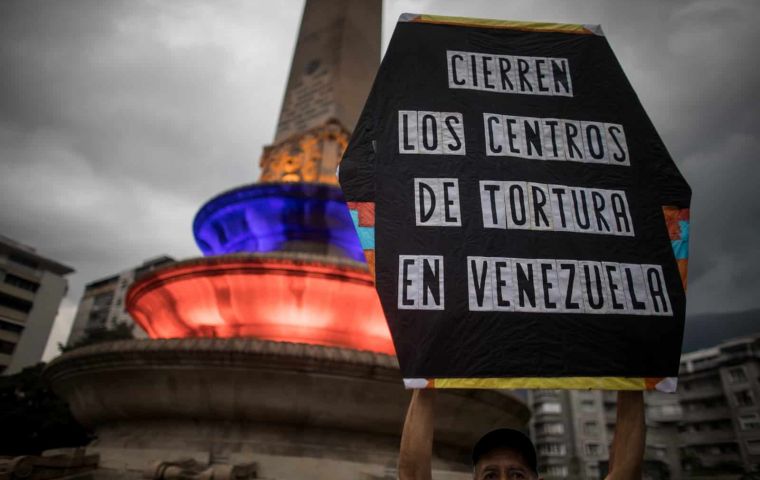MercoPress. South Atlantic News Agency
UN fact-finding mission blasts Maduro's Venezuela for reiterated human rights violations
 The State’s repressive structures have not been dismantled, and the Government has recently intensified efforts to reduce civic and democratic space
The State’s repressive structures have not been dismantled, and the Government has recently intensified efforts to reduce civic and democratic space Attacks on civic and democratic space in Venezuela are intensifying through State policies aimed at silencing opposition and criticism of President Nicolás Maduro’s Government, the UN Independent International Fact-Finding Mission on the Bolivarian Republic of Venezuela said in its latest report released this week.
The Mission, which investigated during the past year alleged human rights violations reported in the country between January 2020 to August 2023, found there are reasonable grounds to believe at least 5 arbitrary deprivations of life, 14 short-term enforced disappearances and 58 arbitrary detentions were committed during that time. The Mission also documented 28 cases of torture or cruel, inhuman or degrading treatment of detainees, including 19 cases of sexual and gender-based violence against men and women over the same period.
While the Mission received a lower number of allegations of gross human rights violations compared to previous periods, it has continued to document numerous cases of such violations against real or perceived opponents to the Government.
“Gross human rights violations continue to occur in Venezuela. In more recent years, these incidents have been more targeted against certain members of civil society, including labour union leaders, journalists and human rights defenders,” said Marta Valiñas, Chair of the Mission. “Mechanisms of repression continue to exist, making international monitoring of human rights in Venezuela more crucial than ever.”
The political and human rights crisis in Venezuela saw a shift in late 2020 and early 2021, marked by the discontinuation of mass opposition protests and of acts of rebellion and insurgency. In previous periods, “hardline” tactics of repression were deployed to silence opposition voices through the commission of crimes, as extensively documented by the Mission.
However, the State’s repressive structures have not been dismantled, and the Government has recently intensified efforts to reduce civic and democratic space, curtailing individual and collective freedoms and tightening its control and restrictions on the work of human rights defenders, civil society organisations, labour unions, the media and political parties.
Continuous threats, surveillance and harassment, together with defamation and censorship, have been employed by the State to silence, discourage and stifle any real or perceived opposition.
”Together, these two types of mechanisms - “harsh” and “soft” - form an oppressive State apparatus, which is used with different levels of intensity, according to the nature and the strength of social dissidence,” said Francisco Cox, an expert with the Mission. “This shows the State's capacity to adapt in order to silence criticism.”
In one case, a group of six labour unionists who had simply been demanding better working conditions were sentenced on 1 August 2023 to 16 years in prison after having been arbitrarily arrested and ill-treated in detention for more than a year.
“By criminalising participation in legitimate activities, the State is silencing and creating a chilling effect on anyone who might consider participating in any activity that could be perceived as critical of the Government,” said Patricia Tappatá Valdez, an expert with the Mission. “The lack of independence and the deliberate actions of judicial and constitutional institutions, including the Comptroller and the National Electoral Council, curtail the ability of social and political leaders to operate freely. These dynamics suffocate and suppress political debate.”
This context is particularly alarming as Venezuela heads toward presidential elections in 2024. At least three opposition candidates have been disqualified by the National Electoral Council, joining other well-known politicians who are prohibited from running for public office.




Top Comments
Disclaimer & comment rules-

Read all commentsWhy not? El Helicoide is the most impressive building in Caracas!
Jan 28th, 2024 - 01:34 am 0https://en.wikipedia.org/wiki/El_Helicoide
Commenting for this story is now closed.
If you have a Facebook account, become a fan and comment on our Facebook Page!